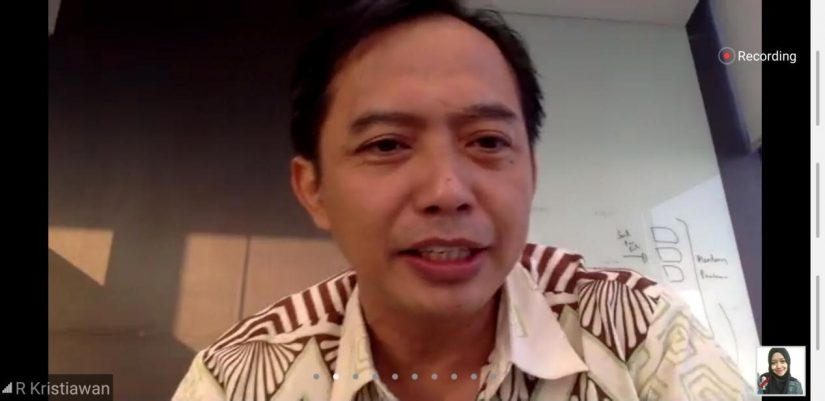
Yogyakarta, July 17th 2020 – Department of Communication Science Fisipol UGM held another ‘Ngopi’ discussion. This fifth series of Ngopi called ‘The People’s Opinions and Crisis Communication of the Corona Pandemic’. This discussion presented three speakers, they were a researcher of Indonesia Indicator, Nur Imroatus S. Then, an advisor of International Media Support, Denmark, R. Kristiwan. And the last was a lecturer of Department of Communication Science, Wisnu Martha Adiputra. The moderator of this event was a lecturer from Department of Communication Science of Fisipol UGM, Wisnu Prasetyo Utomo.Nur began the discussion by showing the Indonesia Indicator observation result towards the news in the online medias during the period from March, 23rd to July, 2nd 2020. She found at least 70 steps of the central government which were reported by the Indonesian online medias. This report, according to Nur, shown the liveliness of the government to talked about their steps to the media. But, the informations about COVID-19 from the government seemed unplanned. “Public communication between central government and local government was often out of sync,” said this woman who was familiarly called Iím.
According to Nur, news from online media also presented negative or controversial things, such as rapid test polemics, new normal, etc. There were at least five sectors which were related to new normal in the news, social education, policies, and economic. But, Nur said that there were three important issues for the people: health issues, educational issues, and economic issues. “Unfortunately, policy makers in Indonesia do not really manage this issue properly,” said Nur.
In line with Nur, Kristiawan also criticized the bad crisis communication of central government. According to him, the narratives, gestures, facial expressions of the central government, especially the Health Minister, in the beginning of the pandemic were not serious and underestimating. Kristiawan also said that communication strategies of the central government was not good at all. Not only the crisis communication, but also for the general issues. There were no comprehensive communication strategies from the government. In fact that, the Indonesian government had a good history of communication related to behavioral changes, it was family planning (Keluarga Berencana/KB). “After the communication of behavioral changes about FP, I saw that the communication strategies of the government, generally, were not developed anymore,” Kristiawan said.
According to Kristiawan, the architecture of communication strategies of the government was still weak. On the other hand, the Indonesian people were really obedient in following the government suggestions. Unfortunately, the government still did not take advantages of this socio cultural capital into their communication strategies. Other than that, there were two shocks for the Indonesian people. First, digitalization shock, the problems of digital media in the form of business models which were not right yet. Second, COVID-19 shock, which worsen our digital media condition in Indonesia. Before the COVID-19, according to Kristiawan, the relation of journalists and media industries already had problems. “The emergence of COVID-19 and a not-so-long experience of independent press in Indonesia raised many problems,” said this man who was familiarly called Wawan.
Agreed with Wawan, Wisnu said that crisis communication of the government put public in a difficult situation. According to Wisnu, the government used way too many strange terms that were very complicated for the people. Other than that, coordination between fields (health, education, and transportation) and also between levels (central government and local government) had not been built properly. On the other side, the government also showed social class bias in handling this situation. “The government used new media extensively and intensively, but in fact not all of the areas in Indonesia have internet access and the digital literacy of the people were inadequate,” Wisnu said.
Wisnu also said that, the inadequate of Indonesian people’s digital literacy made them easily believe in hoaxes. Other than that, according to Wisnu, there were at least five problems in the Indonesian public places. First, trivialization, the changing form of an important issue became a trivial issue. Second, issues commercialization, which made the COVID-19 news only became fulfillment of economic interests of the media. Third, public spectacle, or we just became the audience not the ones who took action. Fourth, public fragmentation which emerged since presidential election until today. Fifth, public apatism toward COVID-19 pandemic. “If the people had become apathetic and did not care about the government’s advices, then the COVID-19 management would become more difficult,” Wisnu said.
The discussion was closed with a question and answer session. One of the audience, Bambang Irawan, a postgraduate student from University of Riau, asked about the right communication model for the government in order to increase public trust. According to Kristiawan, they needed to looking for a competent spokesperson, could master the problem, and had a clear articulation. “Public trust could be increased by looking for a responsive communication style, fulfilling the public needs, and mastering the the techniques by learning through the last epidemic cases references,” Kristiawan concluded.
